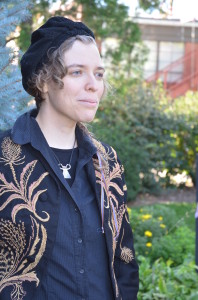Today’s interview features Bogi Takács, who contributed to the Body issue with eir poem “Outside-in / Catalytic Exteriorization“. This is Bogi’s third appearance in the magazine, after “The Handcrafted Motions of Flight” and “The Tiny English-Hungarian Phrasebook for Visiting Extraterrestrials“.
Bogi Takács is a Hungarian Jewish author, a psycholinguist and a popular-science journalist. E writes speculative poetry, fiction and pieces that defy categorization. Eir works have been published or are forthcoming in venues like Strange Horizons, Apex, Through the Gate, GigaNotoSaurus and more.
I stagger through a nighttime landscape
of power lines while the light of the full moon
scatters, flickers in pools of groggy dark water
and the grid hums inside my chest cavity;
– from Outside-in / Catalytic Exteriorization
ST: What inspired this particular poem? What would you like readers to know about your context, and how it relates to your poem?
The poem is very personal, but I prefer not to discuss this in detail. The title is from a scene in Carl Gustav Jung’s autobiography Memories, Dreams, Reflections cowritten and edited by Aniela Jaffé, where Jung is having an aggravating debate with Freud:
While Freud was going on in this way, I had a curious sensation. It was as if my diaphragm were made of iron and was becoming red-hot – a glowing vault. And at that moment there was such a loud report in the bookcase, which stood right next to us, that we both started up in alarm, fearing the thing was going to topple over on us. I said to Freud: “There is an example of a so-called catalytic exteriorisation phenomenon.”
“Oh come,” he exclaimed. “That is sheer bosh.”
“It is not,” I replied. “You are mistaken, Herr Professor. And to prove my point I now predict that there will be another loud report!” Sure enough, no sooner had I said the words than the same detonation went off in the bookcase.
ST: Is the Body a central theme in your work? If so, what other works of yours deal with it? If not, what called you to it this time?
I’d say it is indeed one of my major themes – especially transformations of the body, major and often traumatic changes in the body. This characterizes both my prose and my poetry. Embodiment in the cognitive science sense is also one of my professional interests as a researcher – how does the shape of our bodies, the input from our sensory organs influence the development of our mind? (Is it even possible to draw such hard boundaries?) How does our environment constrain and expand us?
I have a poem with slightly similar body aspects as the present one in Strange Horizons. I likewise shouldn’t forget about my poem in Stone Telling, The Handcrafted Motions of Flight, which I wrote because I couldn’t find a speculative poem about a neutrally gendered person where said person was not a robot or clone.
When it comes to prose, I had a story in Apex a few months ago, Recordings of a More Personal Nature, which is about several of these concepts related to the body… Memory stored outside the body in more than one sense, manipulating the body to reach desired mental effects, and so on.
As the one-sentence summary goes, it is about “quasi-Jewish magical archives, also torture!”
I also had a story in the anthology Mirror Shards 2. (ed. Thomas K. Carpenter) involving symbiotic bioweapons… and Orthodox Jewish girls. How far are you willing to go to save your friend’s life and yours? This one gets slightly graphic in places and has people getting cut up.
ST: What else would you like to tell our readers about your poem?
It actually features my body – I made a video reading!
ST: Do you have any upcoming projects you might like to talk about?
I have several more stories dealing with the body coming up – in my historical fantasy story Spirit Forms of the Sea forthcoming in the Lovecraftian anthology Sword and Mythos (eds. Silvia Moreno-Garcia and Paula R. Stiles), a young Ancient Hungarian girl is changed in multiple ways by a meeting with a suspiciously Cthulhu-like monster.
In the far-future novelette Three Partitions that just came out in this month’s GigaNotoSaurus, I try to tackle issues of being Orthodox Jewish and non-binary-gendered IN SPACE. You can claim you are one gender, but what if your community refuses to accept it because your body doesn’t match their preconceptions? (I’m going to say upfront that some of those issues are just not very amenable to tackling; I quit Orthodoxy over them, though I am still a religiously observant person.)
Finally, Changing Body Templates in Strange Bedfellows: An Anthology of Political Science Fiction (ed. Hayden Trenholm) involves shapeshifting both in a personal and a political sense – what if someone suddenly finds themselves with an incredible amount of power that comes from having a mutable body? It is very much an anti-superhero story and also not a “power corrupts” story – it is more about how our environment and social context constrains our actions, especially if we are underprivileged. (It was inspired by Hungarian computing research during the Cold War.)
Right now I am writing a fantasy novelette exploring the effects of external restriction on the mind; it also has people running up and down floodbanks (very loosely based on my experience of the 2013 flood of the Danube, with record high water levels in my area) and cinematic magical action without fireballs.
I also love to read about the body and I occasionally review short fiction; I am very happy to receive recommendations!
ST: Thank you very much, Bogi!
_____
If you enjoyed this poem and the interview, please consider letting the poet know! Also, we now have a Patreon page, and would appreciate your support.


Pingback: 2014 Rhysling award eligible poems | Stone Telling blog